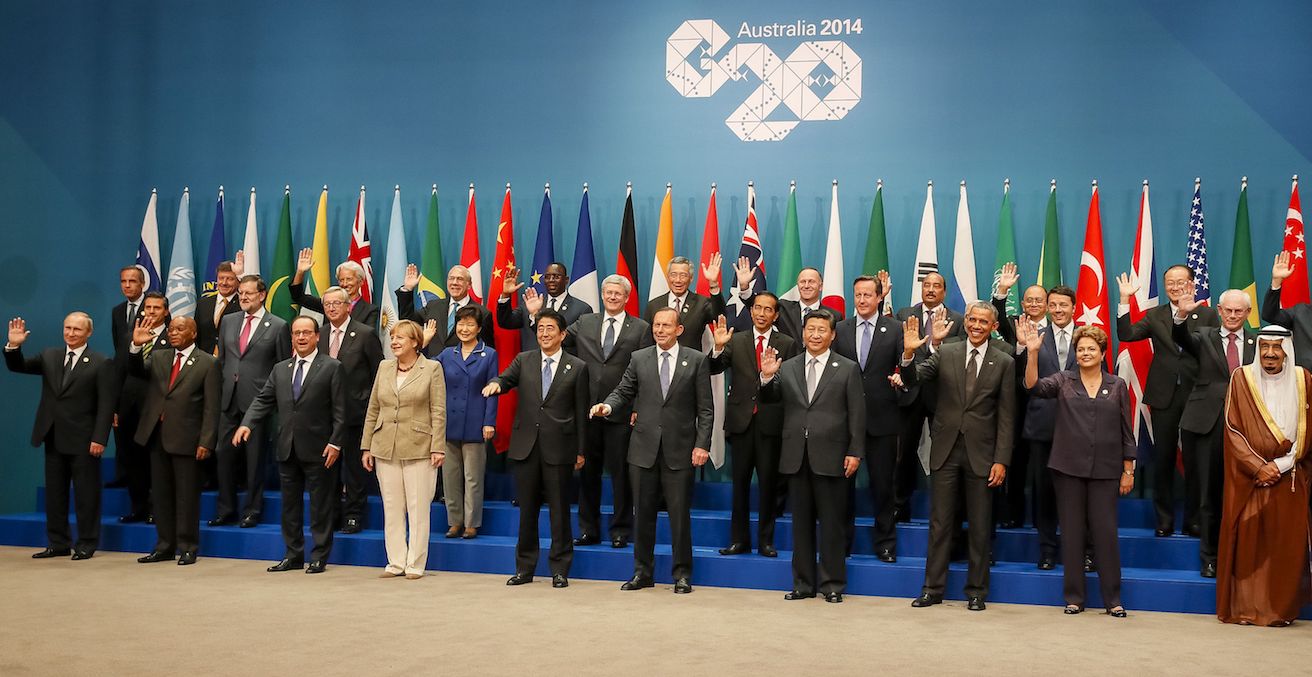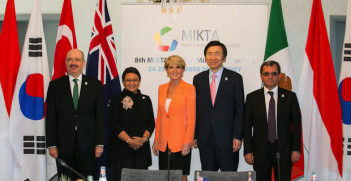Argentina's G20 Leadership: Lessons from Australia

As Argentina steps into the presidency of the G20, what insights can the country garner from Australia about the power and potential influence of the role?
It is widely acknowledged by those who participate in multilateral negotiations that the chair matters. Many negotiators would assert not only that the chair matters to the negotiations, but that the actions taken by the chair have a direct impact on the outcome.
The study of international organisations (IOs) has focused almost exclusively on ‘formal’ IOs, such as the United Nations or the World Trade Organization, and not on ‘informal’ IOs, which have no formal treaty and/or secretariat. Yet informal IOs are becoming increasingly important as world leaders turn to smaller and more flexible forums, such as the G20, to address global challenges
In the last five years, the G20 has emerged as the premier forum for addressing some of the most pressing issues facing the world, from reform of the international financial architecture to reinvigorating the global trade regime and bringing the international energy architecture into the 21st century. It is also the most dramatic illustration of the shifting balance of power in the international system with a membership that includes the growing power of the BRICS, which is now at the centre of discussions about the future.
The G20 has no founding documents, buildings or permanent staff. As such, it has no permanent secretariat, and the host of the G20, which rotates each year, acts as both the chair and the secretariat for the period of its presidency. The informal structure reflected the preference of its member states in the wake of the global financial crisis in 2008 to establish an informal forum for world leaders to meet and consider a common response to the unfolding financial collapse. As a result, there are no formal decision-making rules and no means to coerce states to comply with any agreement reached. This also means that the chair of the G20 has some flexibility.
The G20 and Australia as chair
The G20 chair or president, which rotates each year, hosts the negotiations and assumes the functions of a secretariat during its presidency. The chair, the past chair and the incoming chair make up the troika which acts as a leadership group. G20 declarations and communiqués carry no legal obligations and cannot be enforced. These informal arrangements provide members with advantages such as flexibility, control over information, minimal bureaucracy and reduced sovereignty risk. These advantages also explain why G20 members have largely preferred a rotating chair rather than a permanent secretariat.
At the 2011 leaders’ summit, Australia was nominated to chair the 2014 G20 negotiations, and in 2013 it took up its position on the troika. As chair, Australia managed both the finance track and the sherpa track. G20 finance ministers lead negotiations on the finance track, which cover issues such as banking regulation, taxation and reform of the International Monetary Fund (IMF). G20 sherpas, the personal representatives of the G20 leaders, lead negotiations covering non-financial issues, such as trade, energy and development. In both tracks, decisions are traditionally made by consensus.
The G20 chair and institutional failures
Australia felt a strong demand from member states to deliver an efficient negotiation process and address the ballooning number of issues and meetings. In response, Australia declared early in its presidency that it was determined “to pare back the agenda” and deliver a three-page communiqué as the previous communiqué had run to 27 pages. A streamlined agenda that flowed through to a shorter communiqué was a constant refrain from G20 officials in the chair’s secretariat, with official after official reiterating the need to structure meetings carefully to prevent “1000 flowers from blooming”, or to deal with members who were referred to as “Christmas tree” parties, because “they always want to add new things to the agenda”.
Like past chairs, Australia devoted considerable resources to engaging with the membership, and particular effort was made to consult with the troika. Australian sherpa Heather Smith visited every G20 member during Australia’s presidency. The motivation was to pre-empt negotiation deadlocks because “one country can block anything if it really wants to”.
However, the role of the chair as a broker will be country-specific. There is good evidence to suggest that middle powers like Australia are well placed to play this role. As G20 officials from several countries pointed out, “Australia is seen as a constructive player” and is “not seen as only in the US camp or the China camp”. This means that it is well positioned to bridge the historical divides between different groups within the G20.
The breadth of issues that the G20 covers and the influence that it has on international affairs, despite its small membership, requires the chair to ensure that negotiations complement what is taking place in other IOs. In 2014 the G20 negotiations on corporate taxation—specifically the negotiations on base erosion and profit-shifting—were directly informed by presentations and reports from the OECD.
Another demand for representation is that G20 members recognise that the institution is not representative, given that many of its decisions have global ramifications. Accordingly, the chair has taken on growing responsibility for engaging with non-member governments, and non-state actors, to consult on G20 decisions and to legitimate those decisions among parties outside the organisation.
The power and influence of the G20 chair
The information that Australia collected by virtue of its position as chair enabled it to broker agreements on issues that may have otherwise not been forthcoming. A case in point was the agreement on G20 growth strategies. Australia decided to use its presidency to focus on growth strategies. Working closely with Canada, Australia urged G20 countries to suggest individual strategies in areas such as investment and infrastructure to boost economic growth. Despite strong resistance from European countries, especially Germany, which was “extremely sceptical”, Australia achieved its first aim in February 2014 when G20 finance ministers announced a 2 per cent growth target. This target was then used by the chair to push structural reforms that would ultimately be incorporated into comprehensive growth strategies ahead of the G20 leaders’ summit.
However, as all of the respondents during the research acknowledged, as chair “you do not have as much control as you think”. For example, the chair’s capacity to select working groups’ chairs is often impeded by geopolitical dynamics beyond the control of the chair. Importantly, the power to influence the negotiation outcome declines as the negotiations move tangible costs and benefits.
Australia’s influence as chair was mediated by the institutional environment, especially the decision-making rules. Although the G20 is an informal IO and nothing very much is set in stone, there is an expectation that decisions will be made by consensus. With such demanding decision rules, there is less scope for the chair to influence outcomes. The limits on the chair can play out via multiple pathways, for example, when it encounters direct opposition from more powerful states, such as the US or China. This is not unique to the G20, and is one of the reasons why many international multilateral negotiations with consensus decision-making stall.
Further, the chair’s influence is mediated by the type of chair, which in the case of the G20 is a rotating chair held by the state that hosts the negotiations. A rotating chair will provide greater scope to influence negotiations because it creates a dynamic of reciprocity. However, the evidence suggests that the chair’s autonomy was a function of the fact that the G20 is a new informal IO. As one respondent explained, with no treaty or secretariat, there “is no real model of how to organise the G20”.
Australia’s presidency of the G20 provides empirical support to much of the rational institutional expectations about the role of the chair in international multilateral negotiation. In the G20, there is strong demand for the chair to overcome institutional failures, by reaching out to non-member states to consult on G20 decisions. Similarly, as the rational institutional perspective would predict, the G20 chair possesses two sources of power—privileged information and control of the negotiation process—that enable it to influence negotiation outcomes to some degree.
Dr Christian Downie is a fellow and the higher degree research convenor in the School of Regulation and Global Governance at The Australian National University.
Dr Larry Crump is senior lecturer and research ethics advisor in the Department of International Business and Asian Studies, deputy director of the APEC Study Centre and a member of the Griffith Asia Institute at Griffith University.
This is an edited extract of an article that first appeared in the Australian Journal of International Affairs on 13 August 2017.





